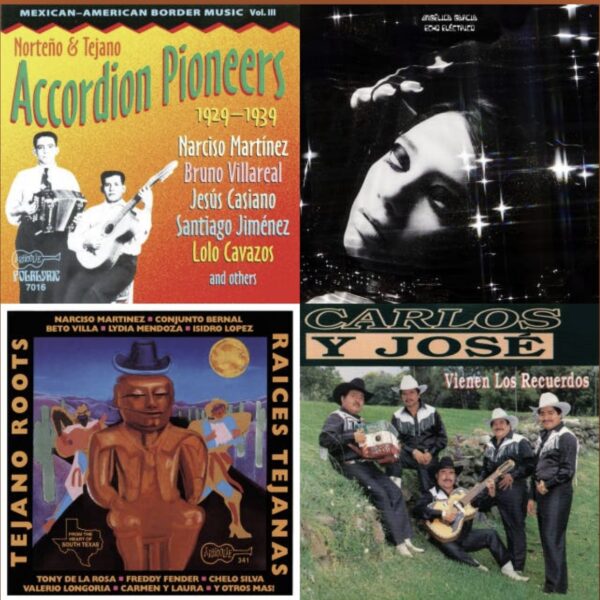Recuerdos Del Sitio: An Anthology of Bracero Music by Juan Luna-Avin
This is a project about the bracero experience told through music that spans the early 1900s to today. The anthology was constructed through research, personal memories, and shared stories from family members, friends, and people the artist encountered. It’s music that farmworkers and laborers brought with them, cherish, grew up with, and listen to in their daily lives. Nostalgia, heartbreak, hope, humor, and resilience are interwoven throughout the narratives.
As part of the Land of Milk and Honey, Luna-Avin will display an installation consisting of real albums as well as handmade and digital reproductions of rare records. A wide spectrum of musical genres is represented, including norteñas, baladas/boleros, corridos, rancheras, banda, cumbias, pop, rock, and contemporary sounds which spans diverse subgenres within each. The artist estimates that just in the 20th century, there were more than 50 major, independent, and short-lived record labels in the U.S. and Latin America that focused on music for rural audiences. Multiple versions and variations of the same songs and the lack of historical documentation and an established database posed a challenge during the selection process. In those instances, Luna-Avin chose the version that is closest to the original based on physical and online research. Resources such as the Arhoolie Foundation and UCLA’s Strachwitz Frontera Collection of Mexican and Mexican American Recordings have been invaluable.
The pandemic has underscored the disproportionate risks agricultural workers take in providing the essential service of harvesting the nation’s food. Despite their significant contributions to this country, they have historically been exploited and overlooked. The project aims to highlight the importance of music to understanding their complex experiences over generations and explore issues of labor and migration that are central to the ongoing fight for farmworker justice.
As the US and Mexico mark the 80th anniversary of the World War II-era Bracero Program (1942-1962), which brought millions of Mexican guest workers to the U.S. to address labor shortages, the project pays tribute to braceros past and present. This is the beginning of an anthology that the artist hopes will grow for years to come.
Guest artists Amelia Amador and Koraima Castro
The installation features original album cover art by Amelia Amador and Koraima Castro, students at CSU Monterey Bay, were invited to collaborate due to their talents, love of music, and unique perspectives as children of farmworkers. Amelia and Koraima, having also worked on the fields, were asked about the songs they selected for their album covers and why they’re meaningful:
These songs were selected because they were the songs that we would request on the farm labor bus on the way to the fields. As my dad drove, the passengers in the back would either be sleeping or requesting which songs should be played. The music would be so loud, but still, some of us managed to sleep as others took it as an opportunity to sing at the top of their lungs to fill the air with energy and spirit. On the way home, the same tradition would take place. As we stomped the dust and the dirt from our boots on the steps entering the bus, the music would give us the last bit of energy to find our seats and slump down. For some of us, a lullaby on the way home, for others a celebration marking the end of the workday. – Amelia Amador
In the first album Seis Soles, the songs that I selected are the songs that I like to hear while working in the fields. The music is combined with Spanish rock and indie alternative rock. These genres were introduced to me by my dad since sometimes during work or at home he plays Spanish rock. It is what pushed me to discover more music of this genre and began getting more interested in Spanish rock. In the second album F.R.E.S.A, these songs are the music my parents like to hear while they work in the fields. The songs were carefully selected since some of them tell stories about migrants coming to the United States for a better life and end up working in jobs like agriculture that makes them feel like they aren’t any better off here than they were in their own country, but they do it to support their families. While some of the songs contain themes of migrant struggles, there are also themes of love and other aspects of living in poverty. They are catchy songs that can make you reminisce about your experiences. – Koraima Castro
This project was supported, in part, by a Foundation for Contemporary Arts Emergence Grant and a California Humanities Project Grant.

